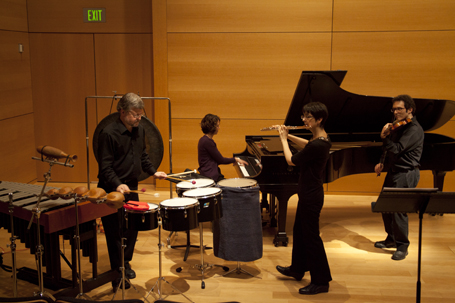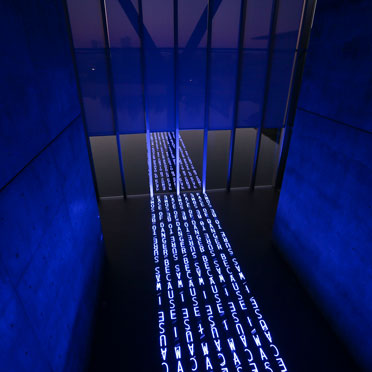Sounds Modern - Broken Dolls

- January 19, 2019 2:00 PM
Sounds Modern presents "Broken Dolls," a concert exploring the dangerous rhythms of feminine identity, agency, and domesticity in American life. Like Laurie Simmons' photographs, the works on this concert explore dizzyingly impossible perspectives and scenarios that show humor and darkness of seemingly harmless, commonplace elements. Presented in conjunction with Laurie Simmons, Big Camera/Little Camera. Admission is free and open to the public.
Program
Agonia (2018-19; world premiere) Sungji Hong
Grounded Orbit (2018-19; world premiere) Ilana Morgan, choreographer
Brown, Party of Two (2000) Elizabeth Brown
1. Ladle
2. Coffee
3. Salad Waltz
5. A Modern Recipe
Command Voices 1919TX-MA (2019) Elizabeth Baker
Lies You Can Believe In (2006) Missy Mazzoli
——— intermission ———
The Pie is Done (2019) Texas Feminist Improvising Group
Willingly (2012-13) Alex Temple
Did He Promise You Tomorrow? (2011) Eve Beglarian
Performers
Sarah Ruth Alexander, voice, dulcimer, percussion
Mike Capone, viola
Mia Detwiler and Andrew May, violins
Elaine DiFalco, accordion, voice, percussion
Jolene Masone, bassoon, percussion
Elizabeth McNutt, flutes, percussion (Sounds Modern director)
Kourtney Newton, cello , percussion
Anatolia Ioannides and Éva Polgár, piano
Sharon Barnhill and Linda Wallace, dancers
Notes
In conjunction with the Big Camera / Little Camera exhibition of Laurie Simmons' work, our program features works in which women composers explore the dangerous rhythms of feminine identity, agency, and domesticity in American life. Like Laurie Simmons' photographs, the works on this concert explore dizzyingly impossible perspectives and scenarios that show the dark humor of seemingly harmless, commonplace elements.
Agonia / Grounded Orbit
When composer Sungji Hong described her upcoming collaboration with Ilana Morgan and pianist Anatolia Ioannides, it seemed a perfect fit with Laurie Simmons’ interest in “women in interior spaces.” Unfolding over an eight-bar repeated pattern in the pianist's left hand, the piece takes its inspiration from Christ in the Garden, painted by Nikolaus Obilman in 1466; in projecting this prayer into physical movement, the choreographer writes that she "creates a meditative landscape exploring moments of women's resistance, folding and unfolding, brokenness, invisibility, and reawakening.” – Andrew May
Command Voices (1919TX-MA)
In a piano, a vibrator really excites secondary harmonics; which, if you have the dampers up, amplifies sympathetic resonance from other strings that represent the partials of the primary fundamental tone and ‘secondary fundamental.’ (Secondary fundamental because the secondary harmonic is loud enough to excite the partials that exist when it is the fundamental tone.) Apart from the fact that this sympathetic response sounds wonderfully fulfilling, of particular interest to me is how it conceptually plays with the idea of command voices. In patients with psychosis, command voices are the ones that instruct them to do destructive things or behave in a certain manner. As a creator, I am intensely fascinated with the relationship between a musician and their instrument as a secondary self, and the implied consciousness of an inanimate object. In many ways, musicians are command voices for instruments, composers are command voices for musicians, and fundamental tones are command voices for the partials that make up the pitches that we know; but all of these instances are largely predictable and controlled.
Vibrating objects present a more accurate depiction of a command voice in a psychotic patient: while the performer may be able to control one or two of them in manipulating the sound of the piano, as the performer adds more of them, they lose control… specific pitches and the resulting resonant tones are left to chance. The instrument comes alive in a manner that removes the performer's and the composer's authoritative energy, changing fundamentally the conversation with the instrument. Furthermore, vibrators in a piano create a certain underlying chaos. As the performer begins to interact with the instrument in a traditional manner (playing the keys) they act as a dominant command voice, but on a deeper level - because of the subtlety of the resonant voices underneath - in this work the artist is presenting the public face of their instrument. We all have noise in our heads, which may manifest as non-command voices, but an inner dialogue is always present; however, we don’t go around sharing our inner thoughts all the time … we have a mask … in this relationship, the performer is the piano’s mask, which conceptually obliterates the conventional relationship between musician and instrument. - Elizabeth Baker
Brown, Party of Two
My husband Lothar printed the photogravures for Laurie Simmons' 'Food Clothing Shelter' portfolio, and we have one of her photographs (a very sinister doll in a bathtub) in our bathroom. He was working with her shortly after we met in 1996, and just thinking about those images brings that time back vividly ... in a very good way. … Brown, Party of Two was written for violist Betty Hauck. Its slightly bizarre sense of humor is characteristic of our escapades together through many years of friendship. - Elizabeth Brown
Lies You Can Believe In
The "lies" in the title are not untruths, and instead refer to the old-fashioned word for an improvised and embellished story. This type of lie is not malicious; the process of invention and the telling of the tale are ultimately more important than the truth behind the account. In this piece I created my own "lie," an invented and embellished urban folk music. The strings tell an improvisatory tale, touching upon the violence, energy, mania and rare moments of calm one finds in a city. This piece is inspired as much by modern gypsy music, punk, and electronica as it is by traditional Bulgarian and Romanian folk music.
- Missy Mazzoli
The Pie is Done
The original Feminist Improvising Group (FIG) was a 5-8 member ensemble founded in 1977 by Scottish vocalist Maggie Nicols and English bassoonist-composer Lindsay Cooper. They were the first group of all-female improvisers who performed publicly; they toured as FIG until 1983, after which the group evolved into the European Women’s Improvising Group. While their initial intent was apolitical, the group developed an interest incorporating social commentary and political parody and farce, and in challenging taboos on-stage. Like much of Laurie Simmons’ work, they celebrated mundane elements of women’s everyday lives. We find FIG’s themes still relevant today; our tribute to them is inspired by their ground-breaking work, personalized and modernized for our North Texan cohort. - Elizabeth McNutt
Willingly
Willingly is one of the most spare, spacious pieces I’ve written in a long time. It’s based on the recorded voices of friends, colleagues, former students and family members talking about unanticipated changes in their lives — some of them trivial and some of them very significant. When Lily Floeter and David Chavannes asked me to write a piece for them, they requested that it respond in some way to Copland’s Duo, which they played on the same concert. The connection with Copland is indirect, but if you look for it, you can hear echoes of both his musical language and his personal circumstances. Thanks to David Berman, Richard Boersig, Eliza Brown, Ethan Brown, David Chavannes, Bex Finken Hernández, Julie Drallos, Arlene Dunn, Larry Dunn, Nancy Temple, Katherine Young, and many others for lending me their voices and their stories. - Alex Temple
Did He Promise You Tomorrow?
I wrote Did he promise you tomorrow? on 7 February 2011 as a memorial to Steven Dennis Bodner (1975-2011). The title is something a woman named Carla asked me in a bar in Los Gatos, California precisely one year earlier, on 7 February 2010, while Chris Porter and I were watching the New Orleans Saints beat the Minnesota Vikings in the Super Bowl. I had never watched a Super Bowl before, but the fact of two river cities being in contention made it sort of a required event that year. I don’t know what Steve’s attachment to the Super Bowl may or may not have been, but I do know that he loved Louis Andriessen’s music passionately, so I have re-purposed a lick from De Volharding as the basis of the piece. - Eve Beglarian
Sounds Modern
Flutist Elizabeth McNutt conceived the Sounds Modern series as an invitation for modern art lovers to enjoy the best innovative modern music. Sounds Modern explores the sonic dimensions of the ideas represented in the galleries, bringing the artwork to life in the concert hall. McNutt also directs the Nova new music ensemble at the University of North Texas, where she teaches in the flute and composition areas. Sounds Modern assistant director Andrew May is on the UNT composition faculty.
Acknowledgments
Thanks to the University of North Texas College of Music for contributing to this event; and to Tina Gorski and John Nuckels for their ongoing collaboration in bringing our sounds to the Modern. Our next event at the Modern will be at 2 pm on August 3. Keep up with the latest Sounds Modern news at www.soundsmodern.org, www.facebook.com/SoundsModern, and @soundsmodern.
